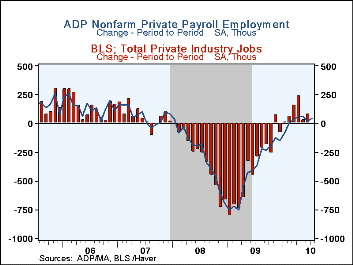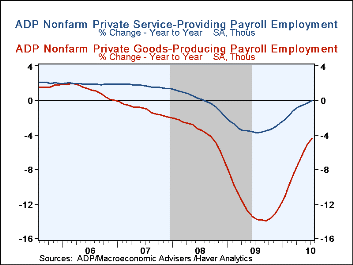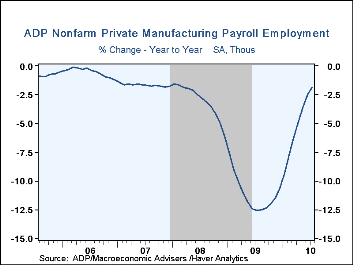 Global| Aug 04 2010
Global| Aug 04 2010ADP Report: U.S. Private-Sector Jobs Rise Minimally For Sixth Month
by:Tom Moeller
|in:Economy in Brief
Summary
The job market expanded again last month, but its rate of gain has been minimal. The payroll processor ADP, in their latest National Employment Report, indicated that private nonfarm payroll levels rose during July by 42,000 after a [...]
 The job market expanded again last month, but its rate of gain has been
minimal. The payroll processor ADP, in their latest National Employment Report,
indicated that private nonfarm payroll levels rose during July by 42,000 after a
19,000 June increase that was revised up minimally. The latest was the sixth
consecutive monthly increase although growth during the period amounted to just
0.2%. A July gain of 39,000 had been the Consensus expectation.
The job market expanded again last month, but its rate of gain has been
minimal. The payroll processor ADP, in their latest National Employment Report,
indicated that private nonfarm payroll levels rose during July by 42,000 after a
19,000 June increase that was revised up minimally. The latest was the sixth
consecutive monthly increase although growth during the period amounted to just
0.2%. A July gain of 39,000 had been the Consensus expectation.
The U.S. Bureau of Labor Statistics will report July payroll employment on Friday. Economists expect a 60,000 worker decline due to the layoff of temporary Census workers. Private sector jobs are expected to rise by 100,000. For comparison, the June increase of 19,000 in ADP's measure of private nonfarm payrolls was accompanied by an 83,000 rise in the BLS measure of private sector jobs. According to ADP and Macro-Advisers, the correlation between the monthly percentage change in the ADP estimate and that in the BLS data is 0.90. ADP compiled the estimate from its database of individual companies' payroll information. Macroeconomic Advisers, LLC, the St. Louis economic consulting firm, developed the methodology for transforming the raw data into an economic indicator.
ADP reported that private service-producing industry employment rose for the sixth consecutive month. The 63,000 July rise topped a gain of 357,000 (0.4%) during the period.. Small-sized payrolls grew 21,000 m/m (-0.7% y/y) while medium-sized payrolls also grew 21,000 (-0.5% y/y). Large service-producing payrolls were unchanged (-1.3% y/y) for the second month.
Goods producing employment fell another 21,000 last month (-4.4% y/y). Payrolls have been falling since early-2006 but the rate of decline has slowed substantially. At the worst, goods producing employment fell 334,000 during February of last year. In the manufacturing sector alone payrolls slipped 6,000 (-1.9% y/y). Large goods producing payrolls fell 10,000 (-4.4% y/y) while small-sized payrolls fell 8,000 (-5.8% y/y). Medium-sized payrolls ticked down 3,000 (-3.1% y/y). Construction employment fell 17,000. The greatest monthly drop of 120,000 was logged during March of 2009. Financial activities jobs fell 1,000, the smallest decline since June 2007.
The ADP National Employment Report data is maintained in Haver's USECON database; historical figures date back to December 2000. The figures in this report cover only private sector jobs and exclude employment in the public sector. The full ADP National Employment Report can be found here and the ADP methodology is explained here.
| ADP National Employment Report | July | June | May | Y/Y | 2009 | 2008 | 2007 |
|---|---|---|---|---|---|---|---|
| Total Nonfarm Private Payroll Employment (m/m Chg., 000s) |
42 | 19 | 63 | -0.7% | -4.9% | -0.7% | 1.1% |
| Small Payroll (1-49) | 21 | 3 | 15 | -0.7 | -4.1 | -0.1 | 1.8 |
| Medium Payroll (50-499) | 21 | 16 | 46 | -0.5 | -5.7 | -0.9 | 1.0 |
| Large Payroll (>500) | 0 | 0 | 2 | -1.3 | -5.6 | -1.8 | -0.2 |
| Goods Producing | -21 | -22 | -21 | -4.4 | -12.3 | -3.7 | -1.1 |
| Manufacturing | -6 | 12 | 16 | -1.9 | -11.1 | -3.0 | -1.7 |
| Service Producing | 63 | 41 | 84 | 0.0 | -3.3 | 0.0 | 1.7 |
Tom Moeller
AuthorMore in Author Profile »Prior to joining Haver Analytics in 2000, Mr. Moeller worked as the Economist at Chancellor Capital Management from 1985 to 1999. There, he developed comprehensive economic forecasts and interpreted economic data for equity and fixed income portfolio managers. Also at Chancellor, Mr. Moeller worked as an equity analyst and was responsible for researching and rating companies in the economically sensitive automobile and housing industries for investment in Chancellor’s equity portfolio. Prior to joining Chancellor, Mr. Moeller was an Economist at Citibank from 1979 to 1984. He also analyzed pricing behavior in the metals industry for the Council on Wage and Price Stability in Washington, D.C. In 1999, Mr. Moeller received the award for most accurate forecast from the Forecasters' Club of New York. From 1990 to 1992 he was President of the New York Association for Business Economists. Mr. Moeller earned an M.B.A. in Finance from Fordham University, where he graduated in 1987. He holds a Bachelor of Arts in Economics from George Washington University.
More Economy in Brief
 Global| Feb 05 2026
Global| Feb 05 2026Charts of the Week: Balanced Policy, Resilient Data and AI Narratives
by:Andrew Cates








